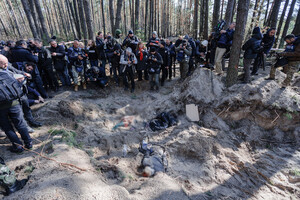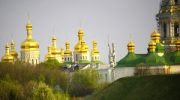The hero of this material was taken to a special camp blindfolded in a truck after beatings, mock executions and other tortures in his house. Russian soldiers have established a grim routine, which they practiced daily in a drunken thirst for blood.

After being beaten by the occupiers, Oleg Bondarenko lost several teeth, his body was covered with scars, and spinal injuries may remain forever. But his sense of humor remains the same, despite a multi-day trial by Russian soldiers who fought in Syria. The latter will bring the horrors of that war to the until recently pastoral suburbs of Kyiv, writes The Guardian.
“My little house,” he said with an ironic smile, staring at the concrete pipe buried in the ground. It is not deep enough to stand in, and not wide enough to sit on; this space is only enough to keep a stooped person in a stooped position. In March, Bondarenko was kept here for two days, he gradually lost the sensation in his arms and legs, and then the ability to move them.
Special camp in Motyzhyn : < strong> murders and imitation executions and torture
Russian troops arrived in Motyzhyn near Kyiv a few days after the start of the war. In a small forest on the outskirts of it, they hid a battery of Hail missiles and other artillery, dug up dugouts for dozens of soldiers, and then set up a camp for torturing and killing civilians in a complex near their positions.
when Bondarenko was brought in – blindfolded in a truck after beatings, mock executions and other tortures in his home, and then on an abandoned farm – the soldiers established a grim routine that they practiced daily in a drunken thirst for blood.
Shallow mass graves dug in a nearby forest
“It was systematic,” he said. The lawn near the large porch of the shelter was used for torture by officers who rested and ate under a canopy. Executions took place on the ruins of the bombed-out house, and shallow mass graves were dug in the nearby forest.
These photos should fly all over the world! pic.twitter.com/gDhzPj9Ep5
– Сергей Наумович (@sergonaumovich) April 4, 2022
The nightmare was led by three men who formed as soldiers during the campaign in Syria. Once in his underground cell, Bondarenko heard them rejoicing over their relocation to Ukraine. “They said that after Syria, it's like a fairy tale for them here. It's a rich village, and they had something to steal.”
From the beginning of the invasion, it became clear that among the military and officers who fought there, there were many who were in Syria. But now Bondarenko's testimony is evidence of the worst abuses by Bashar al-Assad's regime during the war in Ukraine. , will soon be announced
The Kyiv Oblast Prosecutor's Office has had to move abruptly from investigating crimes in small towns to documenting mass atrocities in a death camp on the outskirts of Kyiv. Senior Regional Prosecutor Oleh Tkalenko told reporters:
“We know about these commanders. We are close to identifying them, and their names will be made public soon. ”
He also noted that the authorities know that a number of Russian servicemen who arrived in the Kyiv region have previously operated in Syria. Bondarenko said that the secret services have already named one of his main torturers.
Unlike Syria, Ukraine can be interrogated and tortured without an interpreter
In Motizhyn, unlike in Syria, soldiers could speak the same language as their victims, but that didn't matter. They used this connection simply to interrogate and torture without the need for an interpreter. In view of the concept that Vladimir Putin used to justify his invasion, he denies Ukrainians as a nation and argues that Ukraine is simply a region of “Greater Russia.”
Bondarenko was dragged to the epicenter of Moscow's deadly operation simply because he lived where he lived – one of the twists of fate that put so many thousands of Ukrainian civilians on the path of brutality by Russian soldiers.
Russian fascism. The village of Motizhin. Two women and four men. Shot. Killed in the back of the head.
Telegram – https://t.co/GLExONwd4u pic.twitter.com/ScLzqQs3Wr– Anatoly Stefan (Stirlitz53) @ April 2, 2022
< p>
The head of the village's territorial army, perhaps not as brave as he was practical, fled with his family at the beginning of the invasion. But he owned a yard next to a drug rehabilitation center where Bondarenko works as a manager.
The Russians were furious after Ukrainians ambushed a column of ammunition transported through the village center. “The next day, Russians approached with two tanks, killed people, shot cars and garages,” said a man who works in a looted and burned village store. They also destroyed several houses at the site of the attack.
On March 23, convinced that representatives of the Ukrainian resistance movement were operating nearby, the occupiers stormed Bondarenko's center, firing on walls, mirrors, and windows. They beat him, imitated the execution, and then tied him to an ATV and forced him to flee while the vehicle was driving, saying that if the man fell, he would be shot.
He managed to stay upright until they reached the next yard, where he was beaten again and another execution was staged. Then, as he could not tell them the location of an unarmed army unit, they loaded him blindfolded onto a truck and drove him to his camp.
Shortly after his arrival, Ukrainian troops began shelling, and his captors fled to the basement, leaving him tied up in the street. “We were told, 'Let them kill their own,'” Bondarenko said, and a piece of shrapnel ran through his abdomen, causing bleeding and scarring.
He was shot in the arms or knees before he died to inflict maximum pain.
He had no idea where he was at the time, although the camp was barely two miles from his home. But he realized what was happening there when soldiers reported that they had just killed the head of the village council along with her husband and son . Known to locals as Olga Petrovna, a name associated with affection and respect, she decided to stay and coordinate aid and territorial defense when the Russians arrived. Her whole family paid for it with their lives; a large billboard with their photo now hangs at the entrance to the village from the road with the words: “Eternal honor from the people of Motyzhyn.”
According to locals, the woman and her family were subjected to the same sadistic ritual as most of the victims of the camp. They were severely beaten, their arms twisted and broken, then, as death approached, they were shot in the arms or knees to inflict maximum pain, then shot in the abdomen again, and then the victims were shot in the back of the head.
< p> I heard him being killed for an hour and a half and I prayed that he would be beaten as soon as possible “
Bondarenko said of a later murder he heard in hiding: “I heard him being killed for an hour and a half and I prayed they would do it sooner.”
In the liberated village of Motyzhyn, Kyiv region, a mass grave of civilians was found: https://t.co/tQEt5LXhhl
One of the photos shows that there were two women and four men in one grave. They were shot in the back of the head. pic.twitter.com/iPqkALtsOS
– Letters (@Bykvu) April 4, 2022
This photo is illustrative, it also shows the victims from Motyzhyn, but not those themselves, about whom Bondarenko tells
The man mentions about 60 soldiers scattered in dugouts with officers in a house near a small lake. Not all were Syrian veterans: there were regular recruits – so inexperienced that they had no idea for two weeks that they were in Ukraine – they had to prepare for commanders and carry water, and who were obviously horrified by what they saw.
“These guys didn't want any of this; they were shocked by what they saw”
In an attempt to possibly preserve their own humanity, they rescued Bondarenko 48 hours after his ordeal. While the torturers were drunk, the recruits pulled him out and took him to a room that was used as a prison at the back of the house. They warned him to keep quiet and cover his face: the commanders might assume that he was among the others in the mass grave, if they did not notice that he had disappeared at all. But if they find it, they will definitely kill.
Two days later, the same recruits opened the door, said that the Russians were leaving, and warned the two men who were inside not to leave for two hours. because of the risk of being targeted by snipers.
“They asked to pray for them,” Bondarenko said. “These guys didn't want any of that; they themselves were shocked, and I still pray for them. They saved my life. ”
Men also dug an individual deep grave to bury a woman killed by a sniper after her father, who was being held with Bondarenko just because he came to the base to seek medical help , begged not to throw her in a mass grave.
Tactics of scorched earth
The Russians burned forests and fields to deprive Ukrainian troops of the opportunity to hide. Now spring is coming back, green shoots are coming out of the scorched earth, and daffodils are blooming just a few meters from the torture chamber.
A book is unfolded near the dugout near the graves. “Stories and Tales”, it looks as if she was abandoned in the midst of a young soldier in a hurry, who did not realize or did not want to know that there was a real horror nearby and that he was part of all this.
See special topic: The occupiers are deploying air defense systems in Luhansk and Zaporizhia – General Staff. To support the offensive, the enemy is preparing cover for its troops in certain areas. The Chief of the General Staff of the Russian Federation was in Izyum and barely managed to go to the shelling The Chief of the General Staff of the Russian Federation Valery Gerasimov came to Izyum to inspire Russian soldiers to attack. The European Commission has allocated funds to countries that accept Ukrainian refugees Advance payments are designed to reduce budget expenditures to help Ukrainians. From 2023, Turkey expects to use gas produced at the bottom of the Black Sea Natural gas deposits were found there in 2020. Temporary housing for pregnant women is being built in Lviv Construction is planned to be completed by July.


